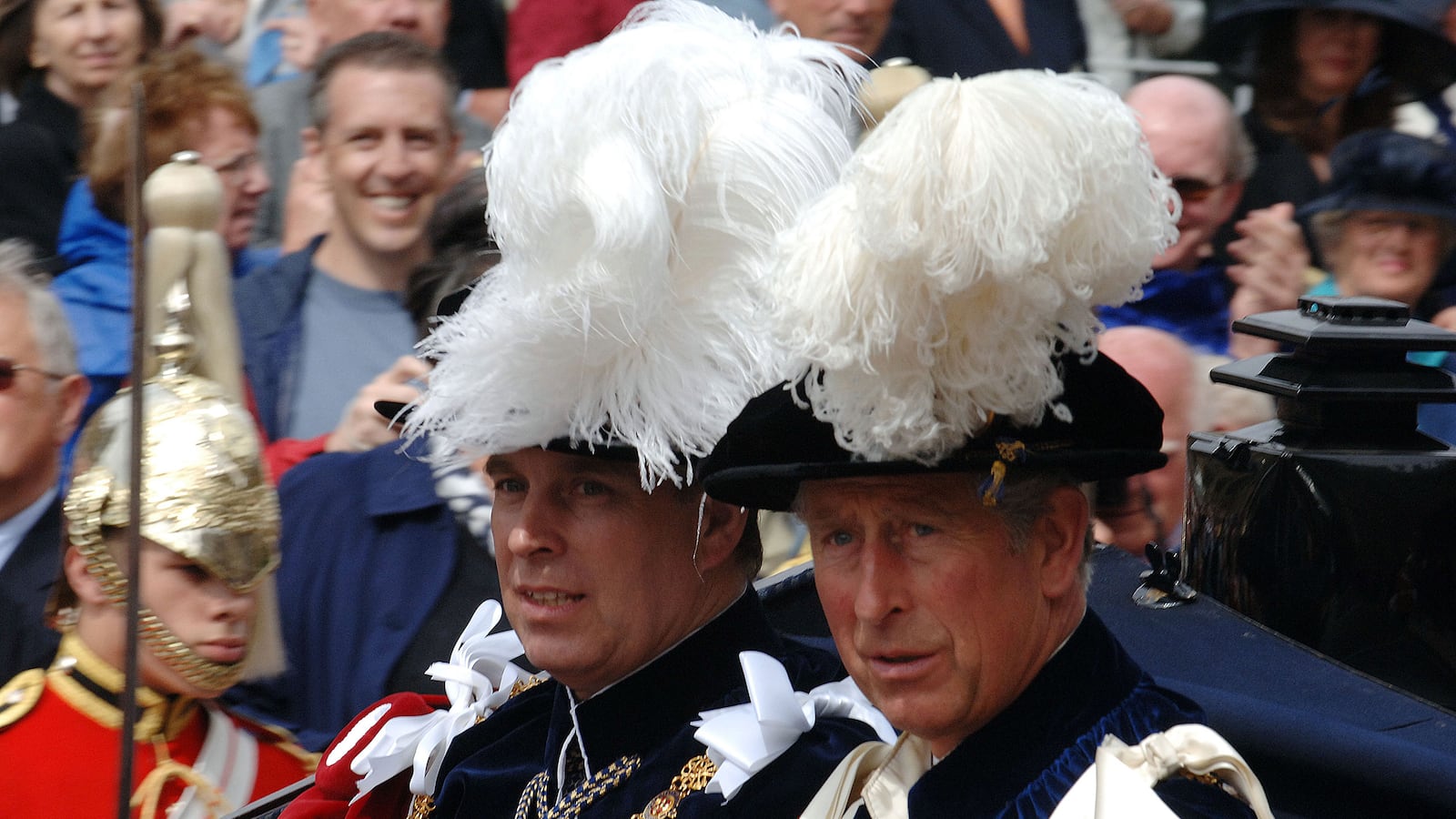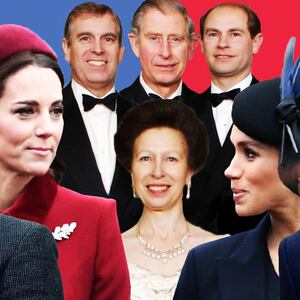If you're interested in our royal coverage, sign up to The Royalist—all the latest royal news and gossip with Tom Sykes and Tim Teeman. For Beast Inside members only.
The absence of Prince Andrew from his brother Charles’ big party on Tuesday, held to commemorate the 50th anniversary of his investiture as Prince of Wales, has renewed questions about the future king’s relationship with and future strategy regarding his troublesome little brother Andrew.
Either Andrew was not invited, or he was invited and declined. Either way—and the palace understandably won’t elaborate—it wasn’t a great omen of healing for the troubled relationship between the two men.
Indeed, one source with excellent connections to the heart of the monarchy described Andrew’s no-show to The Daily Beast as “a naked display of hostility” between the two brothers.
Prince Edward, the youngest royal sibling, was also not in attendance, although his excuse for not attending the function was solid—he was officiating at an event for his father’s long-running Duke of Edinburgh award program.
Edward will likely be made the Duke of Edinburgh on the death of his father and is expected to become the figurehead of the awards program, which he already devotes much of his time to managing and promoting.
Although the palace refused to say whether or not Andrew had been invited, sources said they believed that, in the normal course of events, invitations would have been issued to Andrew and Edward, as they were to Charles’ sister, Princess Anne, who did appear.
But the non-appearance of Andrew left guests and observers mystified. All sources at the palace could offer was that he was busy with “a private engagement.”
This is a fancy way of saying he was doing something else.
“It is pretty extraordinary,” said the source. “One hears tales of tension between the brothers, but the more you reflect on this, the more peculiar it seems.”
The source added that the no-show by Andrew was all the more baffling as it had originally been proposed that the event would be held in Wales, but that it had subsequently been decided to hold it in London to enable all the family to easily attend, with the Welsh delegation forced to schlep up the M4 motorway to pay homage to their master in the capital.
The irony is that even if it was Andrew who snubbed his brother, his no-show is likely to have delighted Charles.
Charles famously seized control of the royal semiotics of the next generation by excluding his brothers from the 2012 balcony appearance after the Diamond Jubilee, and cemented his grip on the actual levers of power in his 2016 coup, when he forced the ouster of the Queen’s personal private secretary (PPS) Sir Christopher Geidt, which left him and his own PPS, Clive Alderton, in a commanding position behind palace walls.
Since then, Charles has sought to reinforce at every opportunity the notion that Andrew and his family are very minor and peripheral figures in the royal soap opera. Charles’ wife, Camilla, did not even attend Andrew’s daughter’s wedding last year.
The excuse—that she was busy entertaining guests at her home in Scotland—appeared calculated to belittle the Yorks, and such a public snub would certainly not have been offered without Charles’ blessing.
Andrew’s “private engagement” on Tuesday may be a retaliatory blow for that insult.
“Charles has been busy drawing the outline of the future shape of the royal family over the past few years,” said the historian and author Robert Lacey, historical consultant for the Netflix series The Crown. “It has Charles at its head and there is a lot of emphasis on Camilla beside him as a queen figure. Then there are William and Harry and their wives expressing their own identity in their own ways. Charles is making it very clear that he sees a minimal public role for his brothers and none for their children.”
That being said, Charles does not regard Edward with anything like the same irritation and annoyance he holds for Andrew. He has been forgiven for an unfortunate incident in which Edward’s TV company violated a media blackout to film Prince William at university 18 years ago.
Edward is widely seen in the family as a workhorse, and, unlike Andrew, does not seek to promote himself. Also unlike Andrew, Edward does not use social-media accounts. Working away quietly in the background is guaranteed to put one in Charles’ good books.
Penny Junor, an author and royal biographer with close links to Charles, said: “If you look at it from any objective viewpoint, Andrew has been an embarrassment over the years on all sorts of levels, and I think Charles is very aware that the monarchy is a precarious institution that needs to be very mindful of how it looks to the public and how they use the privilege that they have. Andrew seems to feel a sense of entitlement that some would argue he does not deserve.
“I am sure he loves Andrew as a brother, but I suspect he is irritated by the company he keeps and his apparent lack of judgment because it reflects badly on the royal family.
“I think there is good reason to believe that if Andrew bowed out of royal duties altogether, Charles would be delighted. But, to some extent he is currently protected by his mother: Andrew has always been her favorite child. But when she dies, and Charles assumes full control, who knows what will happen?”
The Queen is said to mourn the frostiness between Charles and her other children (although Charles respects Anne’s work ethic, brother and sister are not close), but, as any wise parent would, she does not get involved.
“The Queen just says, ‘Well, there is nothing you can do about Charles,” said another source. “What is she supposed to say? ‘Like your brother more’? She doesn’t intercede. That’s not her style.”
While much of Charles’ mistrust of Andrew stems from the poor decisions and untrustworthy friends he has surrounded himself with in the last few decades, some of the resentments go back to their very different childhoods.
It is often remarked that the two sets of children, separated by almost a decade (Charles is 70, Anne is 68, Andrew is 59 and Edward is 54) were brought up so differently as to almost be brought up in different families. Charles actually does not and never has known Andrew and Edward very well as a result. Charles and Anne suffered from the attention the Queen and Philip had to give to accession, the coronation, and Philip’s protracted absence during the Commonwealth tours of 1953 and 1954.
Andrew and Edward got much more hands-on childhoods, as the Queen made a deliberate attempt to have a more normal family.
As the royal biographer Ben Pimlott wrote in his 1996 biography of Her Majesty, citing “a helper,” “She was a less natural mother with Charles and Anne… whereas she was much more the besotted parent with Andrew and Edward.”
The core of the problem, by this reading, is that both Andrew and Charles grew up believing that they were the special one, and have allowed shadows of those childhood complexes to flavor their adult relationship.
Even discounting Andrew and Edward’s absence on Tuesday from the party, there was a strangely wooden atmosphere about it, perhaps because this was a party a young Prince Charles could never have imagined would happen.
Fifty years as Prince of Wales is a special kind of curse. In fact he was actually created the Prince of Wales 60 years ago, at the age of 9, on July 26 1958, but was formally invested with the title at Caernarfon Castle by the Queen on July 1, 1969. He has been heir apparent since the death of his grandfather in 1952, when he was 3.
While no doubt personally delighted that his mother appears to be trucking along brilliantly at the age of 91 and could easily keep going for another decade or more, his life has been blighted by the endless wait for the crown. Charles, 70, is going to inherit the job to which he was born at an age by which most people have long since retired.
“Impatient, me?” Prince Charles once joked, “What a thing to suggest! Yes of course I am. I’ll run out of time soon. I shall have snuffed it if I’m not careful.”
He made that quip in 2012.
Both he and Andrew have been enormously frustrated as they have searched and struggled to find a purpose in life. Both are extravagant and love the high life. Both have seen marriages fail. Both have been pilloried by the press.
Both feel in a way that they have been denied their destiny.
Sometimes, in even the closest families, it is the similarities that drive us apart.
And that, ultimately, may go some way to explaining Andrew’s absence from his brother’s big bash on Tuesday last week.







